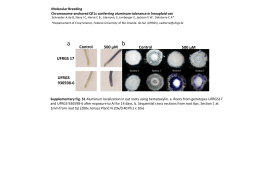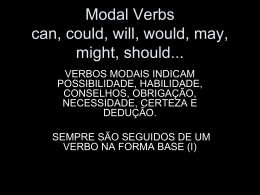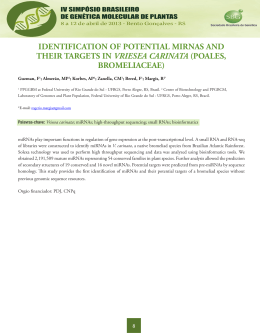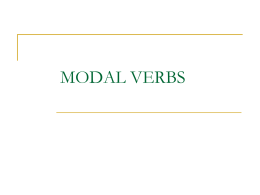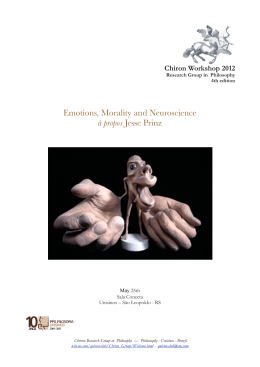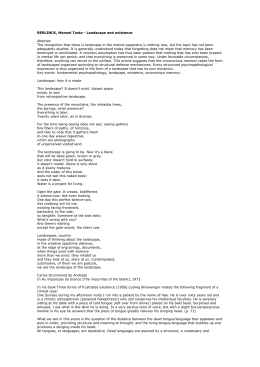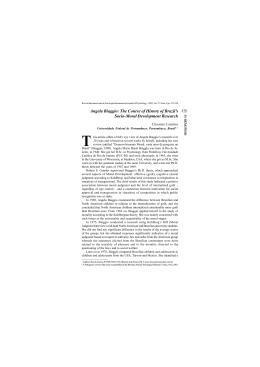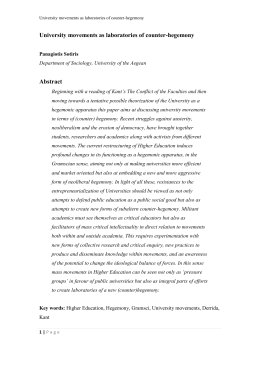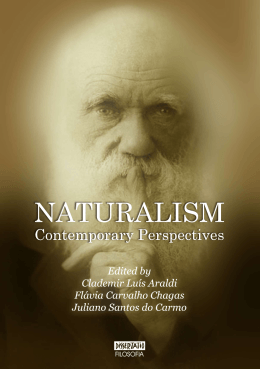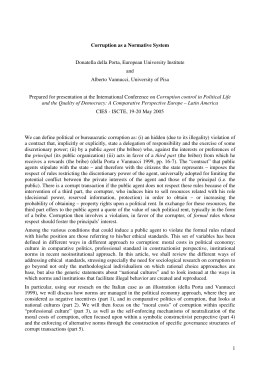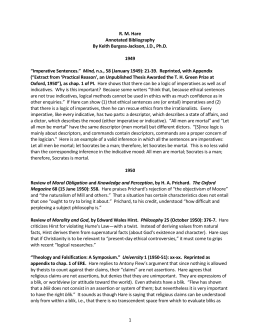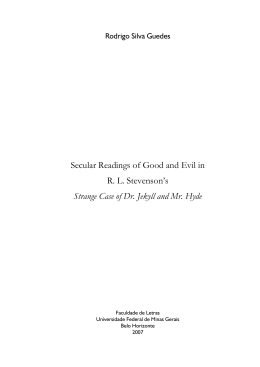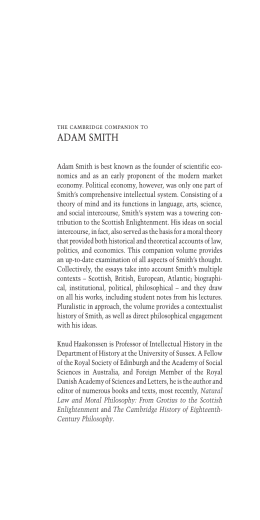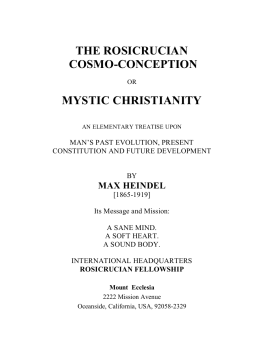Porto Alegre UFRGS August 8, 2014 Kant’s ‘I’ in ‘I ought to’ and Freud’s Superego 1 Kant’s ‘I’ in ‘I ought to’ and Freud’s Superego Béatrice Longuenesse Presentation to the philosophy department at Porto Alegre, UFRGS, Friday, August 8, 2014 1-Preliminary Remarks: In the previous lecture (“Kant on Persons”) I have defended the view that Kant’s criticism of the rationalist notion of a person left it open to him to defend a notion of person as a living being, endowed with unity of apperception and consciousness of the moral law. Such a notion, I claimed, would be “necessary and sufficient for practical use,” namely for moral use. No need to return to the notion Kant criticized in the Third Paralogism of Pure Reason. My thesis in this lecture: Freud provides tools for a developmental account of persons in this empirical sense (individual human beings, conscious of their own numerical identity at different times and taking themselves to be morally accountable for their actions). 2- Kant’s ‘I’ in ‘I ought to.’ Four main structural features of our mental life in ascribing to ourselves the moral ‘I ought to.’ 2-1: Mental conflict. The individual ascribing to herself the moral “ought” (the current thinker of the thought ‘I ought to X’) is conscious of herself both as the author and as the recipient of the moral imperative. 2-2: The moral ‘I ought to’ and feeling. Ordinary human understanding has immediate insight into what is morally permissible or impermissible by a peculiar kind of feeling: respect for duty. Rationally assessing by moral reasoning the permissibility or impermissibility of actions serves to clarify that immediate insight and guard it against the sophistries of moral skeptics and the counterinfluence of self-love. 2-3: Motivated blindness to the grounds of one’s actions. Two kinds of blindness: 1) Lack of clear representation of the universal moral principle under which an action is permissible or prohibited. 2) Propensity to deceive oneself about the grounds of one’s action. T1 “[There is] a certain perfidy on the part of the human heart (dolus malus) consisting in deceiving itself as regards its own good or evil disposition […] This dishonesty, by which we throw dust in our own eyes and which hinders the establishment in us of a Porto Alegre UFRGS August 8, 2014 Kant’s ‘I’ in ‘I ought to’ and Freud’s Superego 2 genuine moral disposition, then extends itself also externally, to falsity or deception of others.” T2 “… We like to flatter ourselves by falsely attributing to ourselves a nobler motive, whereas in fact we can never, even by the most strenuous self-examination, get entirely behind our covert incentives, since, when moral worth is at issue, what counts is not actions, which one sees, but those inner principles of action, which one does not see.” 2-4: ‘I ought to’ and consciousness of one’s own body. - In the moral ‘I ought to,’ the content of the ‘ought’ is determined by the empirical, sensible nature of the agent. - What Kant calls our “predisposition to the good” includes not only our rational nature (personhood) but also our animal and human nature: cf. the three “predispositions to the good” listed in Religion Within the Boundaries of Mere Reason. - In personhood itself, self-consciousness is indexed to a particular living, desiring, pleasure-seeking entity. 3- Freud’s Super-ego 3-1 Freud’s three ways of distinguishing between conscious and unconscious mental representations: descriptive, dynamic, structural. 3-2 The structural distinction: primary and secondary processes. Pleasure principle vs. reality principle. 3-3 Primary processes under pleasure principle: das Es, the Id. Secondary processes under reality principle: das Ich, the Ego. T3 “We have formed the idea that in each individual there is a coherent organization of mental occurrences; and we call this his ego.” T4 “If the ego were merely the part of the id modified by the influence of the perceptual system, the representative in the mind of the external world, we should have a simple state of things to deal with. But there is a further complication. [We have been led to assume] the existence of a stage in the ego, a differentiation within the ego, which may be called the ‘ego ideal’ or ‘super-ego.’ The fact that this part of the ego is less firmly connected with consciousness is the novelty which calls for explanation.” T5 “As the child was once under a compulsion to obey its parents, so the ego submits to the categorical imperative of its superego.” T6 “Kant’s Categorical Imperative is the direct heir of the Oedipus Complex.” 4- Kant’s ‘I’ in ‘I ought to’, and Freud’s Superego 4-1: Mental conflict: Porto Alegre UFRGS August 8, 2014 Kant’s ‘I’ in ‘I ought to’ and Freud’s Superego 3 The superego as an internalization to the ego of the parental law. 4-2: Moral imperative and feeling. Moral consciousness may take the form of a mere feeling: respect for duty according to Kant, awe and guilt according to Freud. Those feelings eventually take the form of conceptually formulated imperatives. 4-3: Motivated blindness For Kant, one may deceive oneself in presenting to oneself as motivated by the moral law maxims for action that are motivated by self-love. For Freud, the very idea of motivation by pure reason (by the moral law alone) is the fundamental self-deception. 4-4: Embodiment For Kant, the moral self is indexed to a particular embodied entity. For Freud, the structure of mental life expressed in the moral ‘I ought to’ has its source in our existence as embodied entities, the locus of drives finding emotional expression in the id and eventually the superego. What can we make of Freud’s statement: “The categorical imperative is the direct heir of the Oedipus complex”? 4-5: Kant and Freud on the categorical nature of moral commands Freud: T7 “Religion, morality, and a social sense – the chief elements in the higher side of man – were originally one and the same thing.” Kant: as grounded in pure practical reason, the moral principle is independent of any religious or social norm. Relativity objection: the idea of universal law is born from the 18th century Enlightenment. In his formula for the categorical imperative, Kant internalizes to the moral command the political ideal of Rousseau‘s Social Contract. Freud’s view can be read both as an endorsement of, and a response to, the relativity objection. Compare with Hegel’s view of Kantian Moralität, to be superseded in Sittlichkeit, ethical life. Freud is not as optimistic as Hegel. He agrees with Kant about the insuperable nature of the conflict internal to our mental life as agents setting moral norms for our actions. He disagrees with Kant about the origins of the conflict and thus the nature of moral command. Porto Alegre UFRGS August 8, 2014 Kant’s ‘I’ in ‘I ought to’ and Freud’s Superego 4 For Freud, the last word should go, not to the superego and its categorical commands, but rather to the ego and the reality principle that directs us to the world: T8 “Wo es war, da soll ich werden.” “Where it (id) was, I (ego) must come to be.“ 5- Concluding Remarks The particularist and the universalist uses of ‘I’. Naturalism and its limits. Taking stock.
Download


